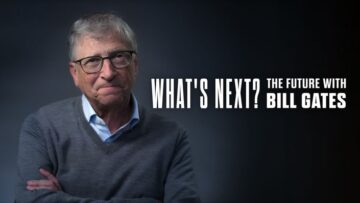by Ashutosh Jogalekar
 Bill Gates has long been one of the world’s leading optimists, and his new documentary, “What’s Next,” serves as a testament to his hopeful vision of the future. But what makes Gates’s optimism particularly compelling is that it is grounded not in dewy-eyed hopes and prayers but in logic, data, and an unshakable belief in the power of science and technology. Over the years, Gates and his wife Melinda, through their foundation, have invested in a wide array of innovative technologies aimed at addressing some of the most pressing issues faced by humanity. Their work has had an especially transformative impact on underserved populations in regions like Africa, tackling fundamental challenges in healthcare, energy, and beyond. In this new, five-part Netflix series, Gates showcases his trademark pragmatism and curiosity as he engages with some of the most complex and important challenges of our time: artificial intelligence (AI), misinformation, inequality, climate change, and healthcare. His approach stands out especially for his willingness to have a dialogue with those with whom he might strongly disagree.
Bill Gates has long been one of the world’s leading optimists, and his new documentary, “What’s Next,” serves as a testament to his hopeful vision of the future. But what makes Gates’s optimism particularly compelling is that it is grounded not in dewy-eyed hopes and prayers but in logic, data, and an unshakable belief in the power of science and technology. Over the years, Gates and his wife Melinda, through their foundation, have invested in a wide array of innovative technologies aimed at addressing some of the most pressing issues faced by humanity. Their work has had an especially transformative impact on underserved populations in regions like Africa, tackling fundamental challenges in healthcare, energy, and beyond. In this new, five-part Netflix series, Gates showcases his trademark pragmatism and curiosity as he engages with some of the most complex and important challenges of our time: artificial intelligence (AI), misinformation, inequality, climate change, and healthcare. His approach stands out especially for his willingness to have a dialogue with those with whom he might strongly disagree.
Episode 1: “What Can AI do for us?”
In the first episode, Gates delves into the world of artificial intelligence, a topic of both fascination and fear. He speaks with leading researchers at companies like OpenAI, exploring the transformative potential of AI, and even brings in science fiction luminaries like James Cameron to provide a broader cultural context. As Cameron wryly notes, the pace of AI development has made much of science fiction obsolete, an observation that underscores just how quickly this technology is evolving.
But the episode also raises important concerns about the ethical implications of AI. As Gates and the experts explore, AI has the potential to drastically reshape society—not just technologically but emotionally. For instance, the growing reliance on AI for decision-making and even companionship could have unforeseen consequences on human relationships and autonomy. The potential loss of huge slices of jobs to AI is another well-known concern. Ultimately, a recurring theme throughout the episode is the importance of ensuring that AI development keeps a “human-in-the-loop,” emphasizing the need for ethical guardrails as we push the boundaries of what this technology can achieve. Read more »

 The late economist Hyman Minsky wrote that after fortunes inflate on the back of a speculative bubble, and after investors’ irrational optimism and overvalued assets inevitably collapse, an economy enters a “period of revulsion,” when people remember that it’s risky to bet big on an uncertain future. Likewise, it’s always during the depths of a hangover that a drinker remembers how whiskey invites its own overconsumption and swears that the only way to avoid another descent into this purgatory is to never touch the stuff again. But after the fog leaves and with a clear head regained, he forgets the pain after the party and declares another Manhattan to be an eminently reasonable investment. Of course, the trick is to recall at just that moment how miserable you’ll be after another three. A pessimistic economist faces the same cyclical popularity as a tee-totaling friend; a consoling voice the morning after becomes a buzz killer as soon as night falls again.
The late economist Hyman Minsky wrote that after fortunes inflate on the back of a speculative bubble, and after investors’ irrational optimism and overvalued assets inevitably collapse, an economy enters a “period of revulsion,” when people remember that it’s risky to bet big on an uncertain future. Likewise, it’s always during the depths of a hangover that a drinker remembers how whiskey invites its own overconsumption and swears that the only way to avoid another descent into this purgatory is to never touch the stuff again. But after the fog leaves and with a clear head regained, he forgets the pain after the party and declares another Manhattan to be an eminently reasonable investment. Of course, the trick is to recall at just that moment how miserable you’ll be after another three. A pessimistic economist faces the same cyclical popularity as a tee-totaling friend; a consoling voice the morning after becomes a buzz killer as soon as night falls again.